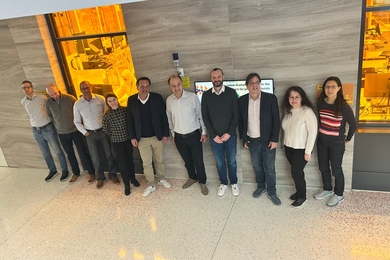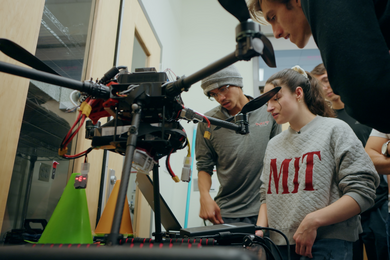The Dibner Institute for the History of Science and Technology has announced the appointments of 14 senior, eight postdoctoral and four graduate fellows for 1999-2000. Six other postdoctoral fellows have also been reappointed.
Senior fellows and their research topics are:
Yemima Ben Menahem, director of the Edelstein Center for the history and philosophy of science, Hebrew University -- development of conventionalism from Poincar� to the later Wittgenstein and Quine.
Lindy Biggs, associate professor, Department of History, Auburn University -- "Negotiating an Industrial Order: Technology and the Problem of Child Labor, 1780-1833."
Olivier Darrigol, director of research, Centre National de la Recherche Scientifique, Paris -- "Aspects of 19th-Century Hydrodynamics."
Karin Figala, University Professor for the History of Sciences, Deutsches Museum, Munich -- research on Isaac Newton's 'exact' alchemy.
J��ran Friberg, Professor Emeritus of Mathematics, Chalmers University of Technology, Sweden -- "The Mesopotamian Mathematical Tradition, and its Central Place in the Early History of Mathematics" at the Dibner Institute.
Robert Friedel, Department of History, University of Maryland -- "The Culture of Improvement."
Thomas Glick, professor of history and director of the Institute of Medieval History, Boston University -- Darwinian research activities of Fritz M��ller in Brazil in the late 19th century.
Arne Kaijser, professor, Royal Institute of Technology, Stockholm -- the linking across borders of large technical systems, primarily in Europe, since the late 19th century.
Nikolai Krementsov, senior researcher, St. Petersburg branch of the Institute of the History of Science and Technology -- "Meeting of Minds: International Scientific Congresses in Stalin's Russia."
Pamela O. Long, independent scholar -- "Engineering and Exorcism in Counter-Reformation Rome."
Mary Jo Nye, the Thomas Hart and Mary Jones Horning Professor of the Humanities and professor of history, Oregon State University -- "Scientific Practice and Scientific Politics in Modern Britain: Essays on P.M.S. Blackett (1897-1974)."
Shirley A. Roe, professor of history, University of Connecticut -- "Radical Biology in the Enlightenment."
David E. Rowe, Professor for the History of Mathematics and Science, Mainz University -- mathematics in Germany focusing on the G��ttingen community, 1895-1933.
Robert W. Seidel, Professor of the History of Science and Technology, University of Minnesota -- "From Lavoisier to Lewis: Chemical Engineering in the West, 1775-1955."
POSTDOCTORAL FELLOWS
The eight postdoctoral Fellows and their Dibner topics are Tara Abraham, historical connections between automata theory, the cybernetics movement and biological discourse. Theodore Arabatzis, the debate over the "discovery" of the electron and the bases for believing in unobservable entities. Silvia De Renzi, "Nature and Erudition in 17th-Century Rome." Orna Harari-Eshel, "The Theoretical Background of Greek Mathematical Practice." Annette Imhausen, "Egyptian Mathematical Knowledge in Middle and New Kingdom Administrative Texts." Paul Lucier, a history of economic geology, 1880-1940. Elizabeth Paris, development of colliding beam storage rings. Kim Plofker, "The Nineteenth-Century Synthesis of Indian and European Mathematical Science."
The following six postdoctoral fellows have been reappointed for a second year:
Slava Gerovitch (PhD 1999), the history of Soviet cybernetics. Christophe Lecuyer, the history of Silicon Valley. Massimo Mazzotti, "Conservative Thought and Scientific Knowledge: A Socio-Historical Perspective." Jutta Schickore, "Exploring Errors -- Methodology in Nineteenth-Century Microscopy." Brett Steele, "The Impact of Reason: Ballistics Theory and Artillery Practice in the Age of Enlightenment," and editing Knowledge as Power: Science, Technology and Warfare in the Early Modern World. Andre Wakefield, the role of the sciences in the administrative and police institutions of central Europe during the 18th and 19th centuries.
GRADUATE FELLOWS
The following PhD candidates at two of the three Dibner Institute consortium-member institutions (MIT and Harvard University) have been awarded fellowships.
Kendall Hoyt (MIT), "The Role of the Military in the History of Vaccine Innovation." Susan Lanzoni (Harvard), "Bridging Phenomenology and Psychopathology: Ludwig Binswanger's Existential Analysis." Craig Martin (Harvard), the influence and tradition of Aristotle's Meteorologica and its place within the Aristotelian corpus. Rena Selya (Harvard), "Phage, Principles and Passion: The Life of Salvador E. Luria."
A version of this article appeared in MIT Tech Talk on May 10, 2000.





